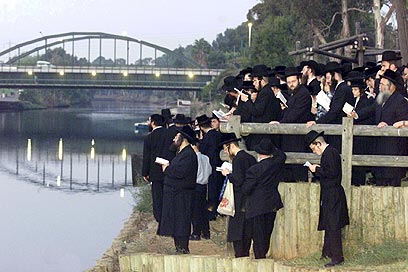

Also known as the Jewish New Year, Rosh Hashana is celebrated on the first and second day of the Jewish month of Tishrei, which is usually in mid-September or the beginning of October.
In Judaism, Rosh Hashana is considered the day in which God was enthroned over world and men, the day in which the world stands in judgment before God, and the first day of the High Holy Days – the 10 days of repentance leading to Yom Kippur.
According to tradition, Tishrei marks the beginning of the agricultural year, when all harvests came to an end and a new cycle of planting began.
The Torah orders Jews to sound the shofar on Rosh Hashana a custom tradition says was used to mark a new king ascending his throne.

Casting off ones sins. Tashlich (Archive photo: Michael Kremer)
Another interpolation of the customs says it is supposed to remind the Jewish people of the Binding of Isaacc (Genesis, 22) and of the receiving of the Ten Commandments at Mount Sinai (Exodus, 19).
One of the main religious traditions customary at Rosh Hashana is the act of Tashlich, or "casting off". Held on the first day of the holiday, the custom calls for one to go to a natural waterway (such as a river, a lake or the sea), stand on its shores and symbolically cast off last year's sins – usually by throwing pieces of bread into the water.
Among the holiday's customs are several dishes carrying a special significance, such as an apple with honey – to symbolize the hope for a good, "sweet" new year; a pomegranate – to symbolize the hope for "as many privilege as its seeds"; and fish – particularly fish heads –symbolizing the wish be "heads instead of tails", meaning to lead instead of trailing behind.
The traditional greeting during the holiday is "Shana tova (happy new year) and may you be written and sealed for a good year (in attaining to the pending judgment of Yom Kippur)".














